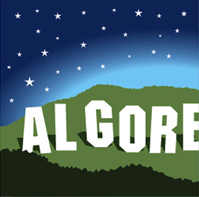POV: The rehabilitation of Ozone Man
POV: The rehabilitation of Ozone Man McGill University
User Tools (skip):
The rehabilitation of ozone man
Among major American politicians, Al Gore was the first to take global climate change seriously. In 1992, then-president George H.W. Bush ridiculed Gore as “ozone man.” Fifteen years later, Gore is no joke. In fact, he has become the gold standard of environmental excellence and has the Oscar to prove it.
Canada’s Conservatives, always under fire for their environmental policies, in February tried to claim Gore’s imprimatur – but Gore said he endorsed nothing and urged the Tories to do far more on climate change than they had. Gore’s campaign intentions for 2008 remain unclear, perhaps because he is waiting to see if current front-runner Sen. Hillary Clinton (D-NY) stumbles.
Recent surveys show many Democrats now want to see more of Gore, who lost the deadlocked 2000 election to George W. Bush in what many Democrats considered a partisan 5-4 Supreme Court ruling and a rigged vote-counting process in Florida.

Tzigane
Gore’s campaign would not depend on the temperature, though bad weather cannot hurt his prospects. Surveys show that Gore, at the moment only a possible candidate, is running behind aggressively campaigning candidates like Clinton and Sen. Barack Obama (D-IL), and roughly even with the party’s third ranked actively campaigning candidate, former Sen. John Edwards (D-NC), the party’s 2004 vice-presidential nominee. If Gore entered the race, his poll numbers would rise considerably.
Americans are willing to consider second acts by politicians: Richard Nixon lost a close election in 1960 and won in 1968; Ronald Reagan lost the Republican nomination to President Gerry Ford in 1976 and won the presidency four years later. Gore’s warnings in 2000 about the dangers posed by a Bush presidency now seem prophetic.
Gore’s campaign does not have to be one big “I told you so,” though that message would be well-received by Democratic primary voters infuriated by Bush. A Gore nomination prevents a lot of the problems that would emerge if the party selected Clinton. Like John Kerry (D-MA), the 2004 Democratic nominee, Clinton voted for the Iraq war and defended it for far too long to satisfy party activists. Gore, in contrast, was against the war from the start. Republicans would love to run against Clinton, as they can revive the Clinton family scandals and use the senator’s already high negative poll numbers to kill her campaign. Divisive figures rarely win presidential elections.
No leading candidate of either party can match Gore’s decades of Washington experience, an important asset in troubled times. Al Gore was a congressman calling hearings on global warming back when Obama was still in high school. Given that 2008, like 2006, seems likely to be a national security election, Republicans will almost certainly clobber Obama for his youth and inexperience if he becomes the Democratic nominee.
Gore’s main liability as a politician has always been his stiffness, but his passionate performance in his film and during his world-wide environmental awareness tour demonstrates that he has become a more confident, media-savvy public figure.
Gore’s environmentalism endears him to youth voters, a powerful liberal voting bloc that Democrats have to bring to the ballot box to win. He speaks Spanish, a key factor in wooing Latino Americans into the Democratic column in those crucial southwestern “swing” states. Wherever they live, a lot of moderate voters may look back on the peace, prosperity and balanced budgets of the Clinton-Gore years with fondness, particularly given the anxiety-filled years that followed.
Stephen J. Farnsworth is a Canada-US Fulbright Research Scholar at the McGill Institute for the Study of Canada and associate professor of political science at the University of Mary Washington in Virginia. He is co-author of The Nightly News Nightmare: Television’s Coverage of U.S. Presidential Elections, 1988-2004.

